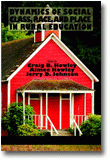
Dynamics of Social Class
Race, and Place in Rural Education
Edited by:
Craig B Howley, Ohio University
Aimee Howley, Ohio University
Jerry D Johnson, University Of North Florida
Published 2014
Half the world’s population lives in rural places, but education scholars and policy makers worldwide give little attention to rural of education. Indeed, most national systems, including in the developed world, treat their educational systems as institutions to “modernize” the global economy.
The authors in this volume have different concerns. They are rural education scholars from Australia, Canada, the United States, and Kyrgyzstan, and here their focus is the dynamics of social class: in particular rural schools but also in rural schooling as a local manifestation of a national (and the global) system.
For the most part, the volume comprises relevant empirical reports, but none neglects theory, and some privilege theory and interpretation. First and last chapters introduce the texts and synthesize their joint and separate meanings. What are the implications of place for social class? How do class dynamics manifest differently in more and less racially homogeneous rural communities? How does place affect class and how might class affect place? How does schooling in rural communities reproduce or interrupt social-class mobility across generations? The chapters engage such questions more completely than other volumes in rural education, not as a final word or interm summary, but as an opening to an important line of inquiry thus far largely neglected in rural education scholarship.
CONTENTS
Preface, Craig Howley and Aimee Howley. Grappling with Constructs, Jerry Johnson. Social Class, the Commodification of Education, and Space Through a Rural Lens, Michael Corbett. Schooling and Place: A Hundred Years of Contests in Rural Kyrgyzstan, Rakhat Zholdoshalieva, Alan J. DeYoung, and Umut Zholdoshalieva. “There Are No Jobs Here”: Opportunity Structures, Moral Judgment, and Educational Trajectories in the Rural Northwest, Rayna Sage and Jennifer Sherman. The Fate of Rural Communities and Schools in a Corporation-Dominated Political Economy: A Historical Interpretation, Paul Theobald and Craig Campbell. The Rural Infl uence on the Relationship Between Social Class and Educational Outcomes, Robert B. Pittman, Dixie L. McGinty, and Julie Johnson-Busbin. Saving the Children of the Poor in Rural Schools, Craig B. Howley, Aimee A. Howley, Caitlin W. Howley, and Marged D. Howley. School Funding in Mississippi: A Critical History and Policy Analysis, Jerry Johnson. Getting There from Here: Schooling and Rural Abandonment, Caitlin W. Howley and Kimberly Hambrick. Schooling in Rural Australia: Tensions Between Youth Aspirations and Community Sustainability, Hernán Cuervo. Dynamics of Diversity in a Rural School, Megan Rhodes. Corporate Oligarchy, White Ethnocentrism, and Xenophobia: Exploiting Minority Labor and Segregating Public Schools in the Heartland of America, Michael J. Volk. Learnin’ a Mountain to Fly: Appalachian Dialects and Language Arts Textbooks, Edwina Pendarvis. Durable Issues in Rural Education, Jerry Johnson. Editor Biographies.
-
Paperback9781623965624
Web price: $45.04 (Reg. 52.99)
-
Hardcover9781623965631
Web price: $80.74 (Reg. 94.99)
- eBook9781623965648

-
 (Re)Envisioning Social Studies Education Research
Current Epistemological and Methodological Expansions, Deconstructions, and Creations
(Re)Envisioning Social Studies Education Research
Current Epistemological and Methodological Expansions, Deconstructions, and Creations
-
 American Educational History Journal - Golden Anniversary Edition
Volume 50 Numbers 1 & 2
American Educational History Journal - Golden Anniversary Edition
Volume 50 Numbers 1 & 2
-
 Distance Learning
Volume 20 #3
Distance Learning
Volume 20 #3
-
 Distance Learning
Volume 20 #4
Distance Learning
Volume 20 #4
-
 Qualitative Research With Diverse and Underserved Communities
Qualitative Research With Diverse and Underserved Communities
-
 Quarterly Review of Distance Education
Volume 24 #1
Quarterly Review of Distance Education
Volume 24 #1
-
 Rekindling Embers of the Soul
An Examination of Spirituality Issues Relating to Teacher Education
Rekindling Embers of the Soul
An Examination of Spirituality Issues Relating to Teacher Education

